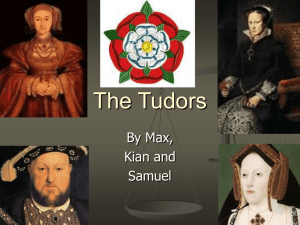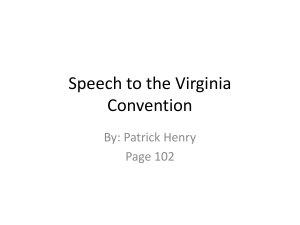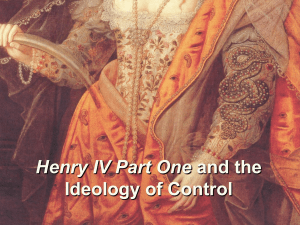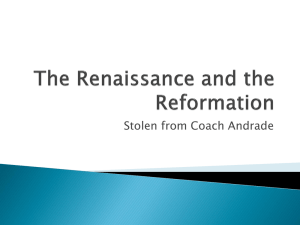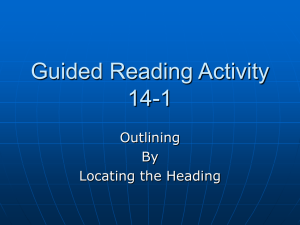Reformation- King Henry VIII Brings Protestantism to
advertisement
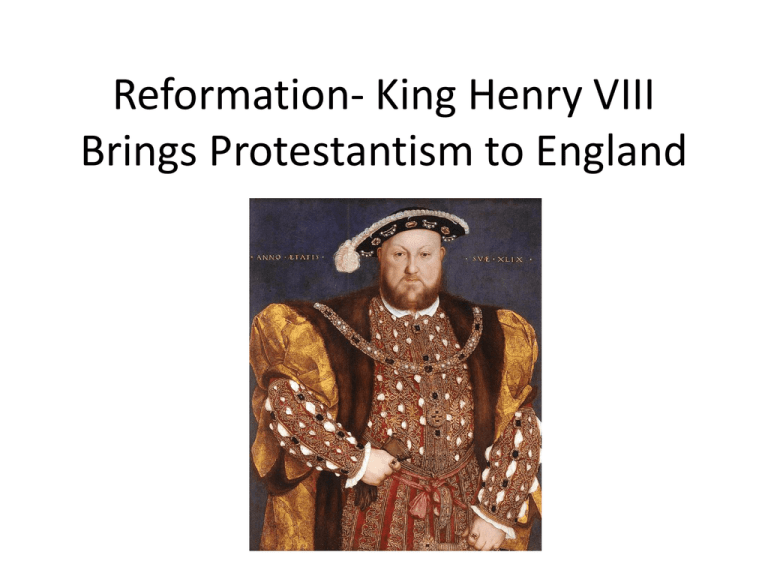
Reformation- King Henry VIII Brings Protestantism to England Warm-Up: Quiz = 9 points per answer • 1. Explain how Renaissance Ideas of Copernicus, Galileo and Gutenberg helped start/spread the Reformation. – A. – B. • 2. What complaints did people have against the Roman Catholic Church which eventually led to the Protestant Reformation? – A. – B. • 3. How did Martin Luther begin/spread the Reformation? – A. – B. 4. How did the Catholic Church respond to the Protestant Reformation? A. B. 5. I am between Poland/Lithuania and France. 6. I am between Scotland and the English Channel. 7. I am a large body of water south of France and the Italian Peninsula. Activity Each group needs to give each member a number of 1-4. Numbers will join other like numbers and will research a part of Henry VIII. New groups will send one person to me to check for understanding. That person is responsible to make sure each group member has the correct information. Groups will break up and return back to original groups. Each group member will teach their group an aspect of King Henry VIII. Complete with your group • 1. Who was King Henry VIII? • 2. What was his goal? Did he achieve his goal? • 3. Evaluate Henry VIII’s impact upon religion and government. – Evaluate means to determine the amount of impact or change. Use a scale of 1 to 5 to assist. One being the least impactful and 5 being extremely impactful. King Henry VIII • King Henry VIII, Tudor (Family name, like Medici Family) monarch, ruler of England in sixteenthcentury Renaissance England, had six wives. • The fates of the wives can be remembered as "Divorced, beheaded, died; divorced, beheaded, survived." • King Henry VIII was much more interested in arms and armor, swordplay, jousting, hunting, and women than in kingship. • He wrote love poems and composed songs such as "Pastime with Good Company." Throughout his life, he also loved regal fashion — after all, what was royalty if one could not dress like a royal. • There still remains an elaborate suit of armor worn by King Henry VIII at the Tower of London Museum. Henry VIII’s Legacy • Henry's obesity hastened his death at the age of 55, which occurred on January 28, 1547. • Even though Henry VIII is known for his marriages, he was a Renaissance man. • Henry VIII encouraged and participated in: art, music, education, foreign language, religion, dancing, hunting, jousting, etc. Queen Catharine of Aragon • At age 18, Henry became King Henry VIII and married Catharine of Aragon (Spain), in 1509. • She had been married to Henry's older brother Arthur, who died after 6 months of marriage. Henry VIII chose to marry Catharine to keep an alliance between Spain and England. • Catherine and Henry seemed to have a happy marriage in the beginning. Although pregnant and giving birth many times, only one daughter survived, Princess Mary. • However, she “failed” to give Henry VIII a son. Anne Boleyn • Henry VIII decided to marry Anne Boleyn , who was a lady-in-waiting to Catharine of Aragon. • Henry hoped that Anne would give him his male heir (future king)….but….. • Divorce, at this time, rarely occurred. – It was very expensive. – Only a few reasons allowed for divorce. – The Pope had to grant it. • Pope Clement VII would not grant it Henry his divorce – he was BFF with Catherine’s cousin the Holy Roman Emperor! • Henry VIII forced Parliament (Congress) to outlaw the Catholic Church and make him the leader of the Church in England. • He then forced the Archbishop of Canterbury to “grant” him his divorce! In 1531, Catharine of Aragon and Princess Mary were sent away. Catherine would die in 1533. • King Henry VIII broke away from the Catholic Church of Rome – the Pope freaked out!! • In one swoop England became a protestant country. • England became Anglican, or Church of England, which they still have today. • The King now controls religion in England! Catholic vs. Anglican • There are only a few differences between the Catholic Church and the Anglican Church. • Henry VIII had few issues with the practices of the Catholic Church. His issue was with the power of the Pope. • The Archbishop of Canterbury, religious head of the Church of England, has no formal political authority, but is recognized as the symbolic leader of the Anglican Church. • However, King Henry VIII facing much opposition much Catholic priests and monks, destroyed many churches and monasteries. As well as killing those who opposed his authority. Princess Elizabeth • Henry VIII married his second wife, Queen Anne Boleyn, in winter of 1532. She gave birth to a daughter in September 1533, who would later become Queen Elizabeth I, arguably the strongest and most successful monarch, King or Queen, in the history of Britain. • The King still desired a male child, and it seemed Anne could not get the job done. • Anne Boleyn was accused of cheating on Henry VIII and plotting to kill him. She was tried and convicted of treason and sent to the chopping block, where her head was chopped off in 1536. • Princess Elizabeth was sent away. • The King had already chosen her replacement, Jane Seymour. Queen Jane Seymour • Henry VIII married his third wife, Queen Jane Seymour, 10 days after the death of Anne Boleyn. • Jane succeeded in giving birth to an heir to the crown — Prince Edward, who later succeeded his father to the English throne as King Edward VI. • Unfortunately, the Queen died a few days after childbirth from an infection. Anne of Cleves • The King's advisors suggested Henry VIII marry Anne of Cleves (Holy Roman Empire), because they wanted an alliance with her brother. • A painting of Anne was made for the king and he agreed to marry her. • Anne became Henry VIII's fourth wife in January 1540. However, Henry VIII had his eye on another woman. He annulled (means marriage never happened) his marriage in July 1540. • Anne stayed in England, however, and remained in good relations with the King and all three of his children, as well as with his future queens. Catherine Howard • King Henry VIII married his fifth wife Catherine Howard, in 1540, only 19 days after his annulment from Anne of Cleves.. • An attractive young lady, she had been pushed into the marriage by her own ambition, as well as the pressure of her powerful family. • King Henry VIII, however, was no longer a young man; he was obese (really fat). An old wound in his leg had never healed but remained an oozing sore — hardly the romantic ideal for a young woman. • Catherine was accused of cheating on Henry VIII. In 1542 she was beheaded. Queen Katherine Parr • King Henry VIII's sixth and last wife was Queen Katherine Parr, in July 1543. • A widow, writer, and welleducated, Katherine was able to survive the bad temper of the King, and the general hardships of being queen. • She was a kind person who brought Henry VIII’s children together. • On January 28, 1547, King Henry VIII died, leaving Katherine a widow. King Henry VIII • Henry's obesity hastened his death at the age of 55, which occurred on January 28, 1547. • Even though Henry VIII is known for his marriages, he was a Renaissance man. • Henry VIII encouraged and participated in: art, music, education, foreign language, religion, dancing, hunting, jousting, etc. Edward VI • When King Henry VIII died, he was succeeded by his son, King Edward VI, age 9, in 1547. • He could not exercise actual power and had 16 advisors to rule until Edward reached the age of 18. • Edward chose to keep the same policies of his father, along with the Protestant faith. • King Edward did not live very long, dying at the age of 16, in 1553. He was succeeded his half-sister, Queen Mary I. Queen Mary I • Princess became Queen Mary in 1553. She, a Catholic like her mother, married Philip II of Spain, also a Catholic. England was angry! • There were many plots and conspiracies on her life, and she grew very suspicious of her subjects — even of her half-sister, Elizabeth. • Mary began to bring back the Catholic Church into England – which was not popular…she also had about 300 Protestants arrested for heresy and burned at the stake. • It was because of these burnings that the Queen gained the epitaph "Bloody Mary". • Mary I died without children in 1558. Queen Elizabeth I • Princess Elizabeth became Queen Elizabeth I, in 1558. under whose reign the English Renaissance came to full bloom, and the arts and literature, especially poetry and theater, flourished. • Elizabeth, a Protestant, kept her father’s laws on place and did not allow the Catholic Church to be in control of England. • She ruled until her death in 1603. Having never married and had children, her Catholic cousin King James VI of Scotland became King James I, king of England. Church Differences In England • When Henry became king in 1509, the church in England was as follows: • By the death of Henry in 1547, the church in England was as follows : • Head of the Church: the pope based in Rome • Church services: all were held in Latin • Prayers: all said in Latin • Bible: written in Latin • Priests: not allowed to marry • Head of the Church : the king • Church services : held in Latin • Prayers: most said in Latin. • The "Lord’s Prayer" was said in English • Bible: written in English • Priests: allowed to marry The End Result • For the next 200 years England faced the struggles regarding the English Monarch needing to be Protestant. • Some monarchs were “passed over” because they were Catholic. • And yes…random killings and wars still took place. Review • 1. Who was King Henry VIII? • 2. What was his goal? Did he achieve his goal? • 3. Evaluate Henry VIII’s impact upon religion and government. – Evaluate means to determine the amount of impact or change. Use a scale of 1 to 5 to assist. One being the least impactful and 5 being extremely impactful. Independent • Compare and contrast Martin Luther’s split of the Roman Catholic Church with King Henry VIII’s split of the Roman Catholic Church? Provide similarities and differences. – Use a Venn-Diagram to organize your thoughts. Once you have completed the graphic organizer, write an explanation of your answer. – Use a minimum of two paragraphs, 5-6 sentences per paragraph. Closure • Was King Henry VIII justified (correct) in making the decision to become the Head of the Anglican Church, or Church of England? If Yes, why? If No, why? Use a minimum of three detailed examples to support your answers.

